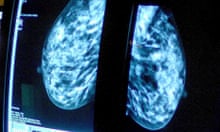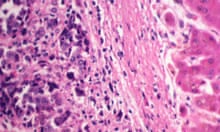Eating two rashers of bacon a day can increase the risk of pancreatic cancer by 19% and the risk goes up if a person eats more, experts have said.
Eating 50g of processed meat every day – the equivalent to one sausage or two rashers of bacon – increases the risk by 19%, compared to people who do not eat processed meat at all.
For people consuming double this amount of processed meat (100g), the increased risk jumps to 38%, and is 57% for those eating 150g a day. But experts cautioned that the overall risk of pancreatic cancer was relatively low – in the UK, the lifetime risk of developing the disease is one in 77 for men and one in 79 for women.
Nevertheless, the disease is deadly – it is frequently diagnosed at an advanced stage and kills 80% of people in under a year. Only 5% of patients are still alive five years after diagnosis.
The latest study, published in the British Journal of Cancer, is from researchers at the respected Karolinska Institute in Stockholm, Sweden. They examined data from 11 studies, including 6,643 cases of pancreatic cancer. They found inconclusive evidence on the risks of eating red meat overall, compared to eating no red meat.
They found a 29% increase in pancreatic cancer risk for men eating 120g per day of red meat but no increased risk among women. This may be because men in the study tended to eat more red meat than women.
They concluded: "Findings from this meta-analysis indicate that processed meat consumption is positively associated with pancreatic cancer risk.
"Red meat consumption was associated with an increased risk of pancreatic cancer in men.
"Further prospective studies are needed to confirm these findings."
The study adds to understanding about the risk factors for developing pancreatic cancer. Overall, smoking is thought to account for around a third of all cases of the disease, and smokers have a 74% increased risk of developing it compared to non-smokers.
Associate Professor Susanna Larsson, author on the study, said: "Pancreatic cancer has poor survival rates. So as well as diagnosing it early, it's important to understand what can increase the risk of this disease.
"If diet does affect pancreatic cancer then this could influence public health campaigns to help reduce the number of cases of this disease developing in the first place."
Around 8,090 people were diagnosed with pancreatic cancer in the UK in 2008 – 3% of all cancer cases – and around 7,780 people died from it. Sara Hiom, director of information at Cancer Research UK, said: "The jury is still out as to whether meat is a definite risk factor for pancreatic cancer and more large studies are needed to confirm this. But this new analysis suggests processed meat may be playing a role.
"We do know that, among lifestyle factors, smoking significantly ramps up the risk of pancreatic cancer.
"Stopping smoking is the best way to reduce your chances of developing many types of cancer and other diseases as well."
Dr Rachel Thompson, deputy head of science at World Cancer Research Fund, said: "There is strong evidence that being overweight or obese increases the risk of pancreatic cancer and this study may be an early indication of another factor behind the disease.
"Regardless of this latest research, we have already established a strong link between eating red and processed meat and your chances of developing bowel cancer, which is why WCRF [World Cancer Research Fund] recommends limiting intake of red meat to 500g cooked weight a week and avoiding processed meat altogether."
Alex Ford, chief executive of Pancreatic Cancer UK, said: "Pancreatic Cancer UK is keen to see more research like this that helps improve our understanding about which aspects of diet and lifestyle may have a bearing on the risk of developing pancreatic cancer.
"These findings, if confirmed by further studies, could help inform people on which lifestyle factors could play a role in limiting their chances of developing the disease."



